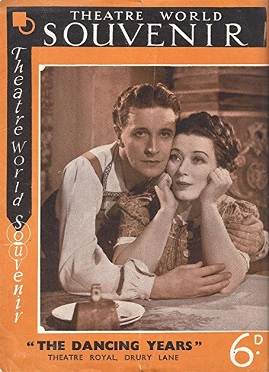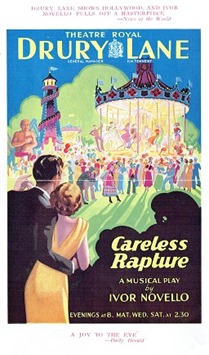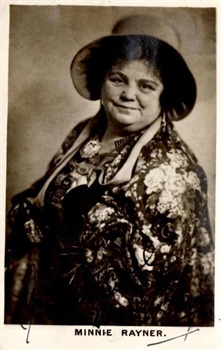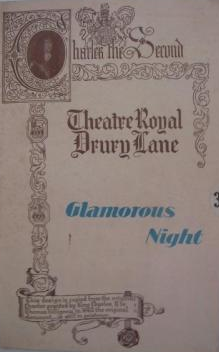Background
After beginning the 1930s by writing a series of non-musical plays, Novello returned to musicals in 1935 with Glamorous Night, the first of several very successful large-scale operetta-style pieces that he premiered in spectacular productions. The musical featured extravagant scenery, including a street with a horse-drawn carriage, a ship, an operetta production and a bustling gypsy wedding, and a ballroom; extensive dance numbers; and shipboard skating. [2] The story echoed the political situation in Romania, where King Carol II had renounced his throne to live with, and eventually marry, a Romany actress, Magda Lupescu. [3]
Productions
Glamorous Night was produced by Ivor Novello. The musical opened at the Theatre Royal, Drury Lane in London on 2 May 1935 to robust ticket sales, but it had a limited run due to the pre-booking of a pantomime at the theatre. It then toured in the British provinces before re-opening at the London Coliseum in May 1936 for another short run, for a total of 234 London performances. The role of Anthony Allen was played by Novello, and that of the gypsy (Militza Hajos) was played by Mary Ellis. It was directed by Leontine Sagan, with choreography by Ralph Reader. The plot echoed current events in Rumania, where the king was willing to give up his reign to marry a Romany actress, Mme. Lupesco. [3]
A movie was made of Glamorous Night in 1937, with Barry MacKay taking the role of Anthony Allen, Otto Kruger as King Stephen and Mary Ellis reprising her stage role of Militza.
The show was briefly revived in November 1975 at the New London Theatre, and was part of a UK tour. It was directed by Alexander Bridge and starred John Hanson and Pamela Field. [4]
Synopsis
A young inventor, Anthony Allen, has created a working television but has not had much success in promoting it. The head of a radio broadcasting company fears competition and pays Allen to suppress his invention. Allen takes a luxury cruise to the "Ruritanian" kingdom of Krasnia in Central Europe. There he sees an operetta, Glamorous Nights, starring the gypsy princess Militza Hajos, the prima-donna of the state opera. He meets the star and learns that she is betrothed to the King of Krasnia. Allen saves her from an assassin and, after she flees the country aboard his cruise ship, he rescues her from a shipwreck caused by another assassination plot. They soon fall in love.
Meanwhile, the gypsies side with the King to overcome a revolution and also promote the reunion of Militza and King Stefan. Brokenhearted, Anthony gives her up, for the good of the kingdom. The king finances Anthony's invention. Back in England, Allen watches the king's wedding to Militza on his television.

Ivor Novello was a Welsh actor, dramatist, singer and composer who became one of the most popular British entertainers of the first half of the 20th century.

Dorothy Dickson was an American-born, London-based theater actress and singer, and a centenarian.

Mary Ellis was an American actress and singer appearing on stage, radio, television and film, best known for her musical theatre roles, particularly in Ivor Novello works. After appearing with the Metropolitan Opera beginning in 1918, she acted on Broadway, creating the title role in Rose-Marie. In 1930, she emigrated to England, where she gained additional fame and continued to perform into the 1990s. She also became known for film roles, including in The 3 Worlds of Gulliver in 1960.

The Dancing Years is a musical with book and music by Ivor Novello and lyrics by Christopher Hassall, set in Vienna, from 1911 until 1938. It follows a Jewish composer and his love for two women of different social classes, with an ending set against the background of Nazi persecution.

Christopher Vernon Hassall was an English actor, dramatist, librettist, lyricist and poet, who found his greatest fame in a memorable musical partnership with the actor and composer Ivor Novello after working together in the same touring company. He was also a noted biographer of Rupert Brooke and Edward Marsh.

Robert Tobias Andrews was a British stage and film actor. He is perhaps best known as the long-term companion of Ivor Novello.

Barry Cuthbert Jones was an actor seen in British and American films, on American television and on the stage.

Reginald Arkell was a British script writer and comic novelist who wrote many musical plays for the London theatre. The most popular of those was an adaptation of the spoof history book 1066 and All That: 1066—and all that: A Musical Comedy based on that Memorable History by Sellar and Yeatman. He was the author of A Cottage in the Country and the Green Fingers series of garden verse.

Gay's the Word is a musical with book and music by Ivor Novello and lyrics by Alan Melville. The musical is a backstage comedy that parodies Novello's own swashbuckling Ruritanian romance plots. The story centres on Gay Daventry, a bankrupt operetta producer who opens a drama school at her country house. This also turns out to be unsuccessful, but it leads to a theatrical comeback for Gay.
Cyril Ornadel was a British conductor, songwriter and composer, chiefly in musical theatre. He worked regularly with David Croft, the television writer, director and producer, as well as Norman Newell and Hal Shaper. He was awarded the Gold Badge of Merit by the British Academy of Songwriters, Composers and Authors for services to British Music and won a total of four Ivor Novello Awards.

Marguerite Namara was a classically trained American lyric soprano whose varied career included serious opera, Broadway musicals, film and theater roles, and vocal recitals, and who counted among her lifelong circle of friends and acquaintances many of the leading artistic figures of the first half of the twentieth century.

King's Rhapsody is a musical with book and music by Ivor Novello and lyrics by Christopher Hassall.

Crest of the Wave is a musical with book and music by Ivor Novello and lyrics by Christopher Hassall.
Olive Sarah Gilbert was a British singer and actress, who, in a career spanning seven decades, performed first in opera and then in many of Ivor Novello's musicals in London's West End.

Sylvia Cecil was an English singer and actress. She began her career in the Gilbert and Sullivan operas with the D'Oyly Carte Opera Company, with whom she performed, off and on, from 1918 until 1937. She also performed in musical theatre, concerts, music hall and variety from 1921, and broadcast on radio. In the 1940s and 1950s she starred in several musicals by Ivor Novello and Noël Coward.

Careless Rapture is a 'musical play' by the Welsh composer Ivor Novello and lyrics by Christopher Hassall. It premiered on 11 September 1936 at the Theatre Royal, Drury Lane. It ran for 295 performances, a relatively modest success given Novello's other major successes.

Minnie Rayner was a British stage and film actress.

Glamorous Night is a 1937 British drama film directed by Brian Desmond Hurst and starring Mary Ellis, Otto Kruger, Victor Jory and Barry MacKay. It is an adaptation of the musical Glamorous Night by Ivor Novello. In a mythical European kingdom, King Stefan clashes with his prime minister and falls in love with the gypsy Melitza.
This is a summary of 1935 in music in the United Kingdom.

Arlette is a 1917 operetta in three acts by Austen Hurgon and George Arthurs with lyrics by Adrian Ross and Clifford Grey. Produced by George Grossmith Jr. and Edward Laurillard it was adapted from the French with music by Jane Vieu, Guy Le Feuvre and Ivor Novello. It opened at the Shaftesbury Theatre in London on 6 September 1917 where it ran for 260 performances. It starred Winifred Barnes, Joseph Coyne and Stanley Lupino.

















